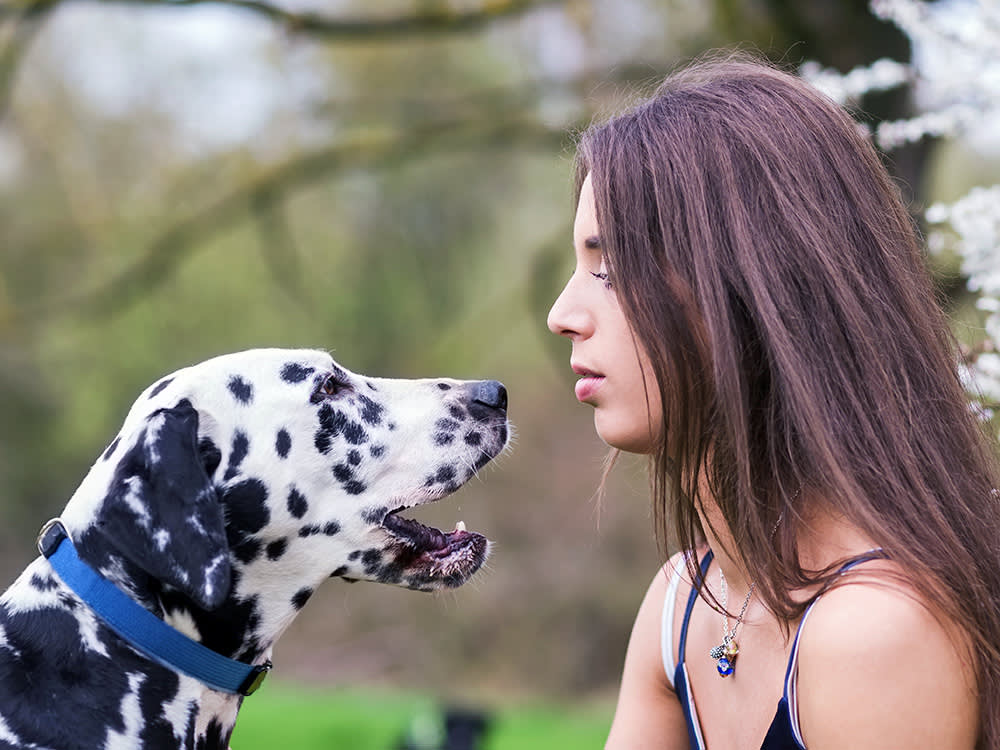Hoarse Bark in Dogs: Causes, Care Tips, and When to See a Vet
Everything you need to know to help your pup.

Share Article
In This Article:
What Causes Hoarse Bark In Dogs? How Dogs With Hoarse Bark Are Treated When You Should Consult a Vet Frequently Asked Questions
Chances are you can recognize your dog’s bark even in a crowd of dogs. Their voice is quite distinct and will cause you to react if it suddenly doesn’t sound the same.
One thing that can change about your pup’s personalized sound is it can become a hoarse bark. There are several different causes of that change, and it may be able to be treated at home or need a veterinarian’s attention. Pet parents need to learn the potential causes of the change in voice, how to provide treatment at home, and when to see the vet.
What causes hoarse bark in dogs?
Hoarseness is known in medical terminology as dysphonia or aphonia and doesn’t have to mean a complete loss of voice. It can also be a partial loss. The sound may be raspy, weak, or a silent bark in dogs. There are several potential causes of a hoarse bark in dogs:

Laryngitis: The larynx, also known as the voice box, can become inflamed. This is one of the most common causes of hoarse bark in dogs. Excessive barking, environmental irritants such as smoke or dust, or infections can lead to this.
Kennel cough: This very common and contagious respiratory infection is caused by Bordetella bronchiseptica and other pathogens. It can lead to a dry, honking cough and is often picked up during kennel stays.
Collar pressure: Tight collars or frequent leash pulling can inflame or injure the larynx and trachea, which in turn inflames the vocal cords.
Laryngeal paralysis: The nerves of the laryngeal muscles can become weak or paralyzed. This is often seen in older, larger-breed dogs like Labradors. This condition causes a hoarse bark and noisy breathing (stridor).
Tumors or growths: Tumors in the throat, larynx, or trachea, as well as polyps or cysts, can interfere with normal vocalization and may lead to hoarseness.
Foreign objects: A foreign object lodged in the throat or vocal area can damage the tissues or cause irritation.
Allergies: Seasonal allergies or reactions to inhaled irritants (like mold or chemical cleaners) can inflame the upper airways.
Hypothyroidism: This endocrine condition can cause generalized weakness and may cause hoarseness in some dogs due to tissue changes around the throat.
How dogs with hoarse bark are treated
Treatment for a hoarse bark depends on the underlying cause. All it takes to treat some cases is rest, while others need veterinary aid. Here are the most common treatment strategies:
Medications
Veterinarians may prescribe medications to treat the root cause of hoarseness, including:
Antibiotics for bacterial infections like kennel cough
Anti-inflammatories or corticosteroids to reduce swelling and inflammation
Antihistamines if allergies are a contributing factor
Thyroid supplements for hypothyroidism
In cases of laryngeal paralysis or tumors, more advanced treatments may be needed.
Getting rest
How do you get a dog to rest their voice? Primarily, avoid stimulating situations such as letting them stand by the door or look out the windows. Try to keep your dog calm and quiet. Crate rest and calming chews may help if your dog is excitable and has a hard time staying quiet.
Using a humidifier
Another possible aid is to use a humidifier where your dog sleeps. Dry air may irritate a dog’s throat and cause a hoarse bark in dogs. This is especially helpful for dogs recovering from respiratory infections or those prone to irritation.
Getting on a healthier diet
If your dog has food intolerances or allergies, they may cause chronic inflammation. Working with your vet to find a high-quality, limited-ingredient diet may help. Dogs with hypothyroidism or chronic allergies can also be helped. Adding omega-3 fatty acids (like from fish oil) may also help by supporting immune health and decreasing systemic inflammation.
Possibly surgery
A more serious cause like laryngeal paralysis or a tumor may make surgical intervention necessary. Surgery is typically a last resort but can be highly effective in the right cases.
When you should consult a vet
Not every case of a hoarse bark needs care, but some do. Here's when to call your vet:
There’s no improvement within a few days.
Your dog stops barking altogether.
The hoarseness is accompanied by noisy breathing, gagging, or coughing.
Your dog seems to be in distress or is having trouble breathing.
Your dog has a history of choking or chewing on foreign objects.
Your dog is a senior or belongs to a breed prone to laryngeal paralysis (like Labs or Huskies).
You feel or see a lump on your dog’s neck or throat.
Your vet will begin with a thorough physical exam with a close look at the throat but will probably need imaging (such as X-rays or endoscopy).
A veterinarian can perform a physical exam, throat inspection, and possibly imaging (like x-rays or endoscopy) to determine the root cause and appropriate treatment.
Bottom line
It can be concerning to hear your dog’s bark change. However, many cases are not serious. They may be from a temporary infection or inflammation or barking too much. Other cases may be more serious and require medical care.
If your dog’s bark doesn’t improve after a few days of rest or if they show signs of distress, coughing, or trouble breathing, a veterinary check-up is necessary. A diagnosis is necessary to determine the right treatment. Chances are, there will be a good prognosis with medication, lifestyle changes, or, in rare cases, surgery.
FAQs
What can you give your dog at home for hoarse bark?
If your dog’s hoarse bark appears mild and there are no other symptoms, you can try the following supportive care at home:
Run a humidifier near their sleeping place.
Encourage rest and quiet time.
Provide plenty of water.
Switch to a harness if your dog pulls on the leash.
Avoid giving over-the-counter human medications, lozenges, or herbal cough drops unless directed by your vet. Many human medications can be toxic to dogs.
What are the natural treatment options for laryngitis?
Natural remedies for dog laryngitis or mild hoarseness may include:
Licorice root tea (cooled): Has soothing anti-inflammatory effects on the throat
Marshmallow root: It can coat and soothe irritated tissue.
Manuka honey: In very small amounts, it may help relieve throat inflammation. (Note: Do not give to diabetics.)
Always check with a veterinarian before trying home remedies, as not all natural products are safe for pets.
How long does dog hoarseness last?
The duration of a hoarse bark depends on the underlying cause. However, if the hoarseness lasts over a few days, it’s time to see the vet.
References:
Burbidge, H.M. “A Review of Laryngeal Paralysis in Dogs.opens in new tab” British Veterinary Journal, vol. 151, no. 1, Jan. 1995, pp. 71–82, https://www.sciencedirect.com/science/article/abs/pii/S0007193505800661?via%3Dihubopens in new tab
Gaber, C E, et al. “Laryngeal Paralysis in Dogs: A Review of 23 Cases.” opens in new tabJournal of the American Veterinary Medical Association, vol. 186, no. 4, 15 Feb. 1985, pp. 377–380,.1985.186.04.377.xml, https://avmajournals.avma.org/view/journals/javma/186/4/javma.1985.186.04.377.xmlopens in new tab
Monnet, Eric. “Surgical Treatment of Laryngeal Paralysis.” Veterinary Clinics of North America: Small Animal Practice, vol. 46, no. 4, July 2016, pp. 709–717, https://www.sciencedirect.com/science/article/abs/pii/S0195561616000097?via%3Dihubopens in new tab

Dr. Shelby Neely, DVM
Dr. Shelby Neely is a freelance writer and veterinarian who graduated from the University of Pennsylvania School of Veterinary Medicine and has practiced veterinary medicine for 30 years, specializing in small animals. Her work has appeared in Allivet, AsktheCatDoctor, WhiskerDocs, Ask the Cat Doctor Radio, Ask the Cat Doctor TV, and numerous other websites, brochures, newsletters, newspapers, and ebooks. In her spare time, Dr. Neely likes to spend time with her three children, two grandchildren, three cats, two grand-cats, and five grand-dogs.
Related articles
![Woman with her dog relaxing in living room.]()
How to Tell If Your Dog Is Sick
Look out for these warnings signs so you know when to call the vet.
![A dog coughing]()
Is Kennel Cough Contagious?
What you need to know about this super contagious disease. (Hint: There’s a vaccine.)
![]()
Can Dogs Get the Flu from Humans?
Or is it OK to snuggle them close while we recover?
Do Dogs Fake Being Sick for Attention?
We’d all love to think that our pups are sweet baby angels incapable of deceit. But are they, actually?
![Beautiful young woman standing on grass area in park and playing with her dog.]()
A “Last-Ditch Effort” Antibiotic May Help Cure the Mystery Dog Illness
What we know about the antibiotic chloramphenicol.
Can Dogs Get Colds?
We’re all sniffling this time of year. Learn if your pup can get a cold, too.






